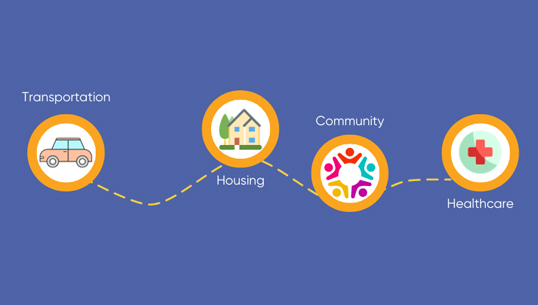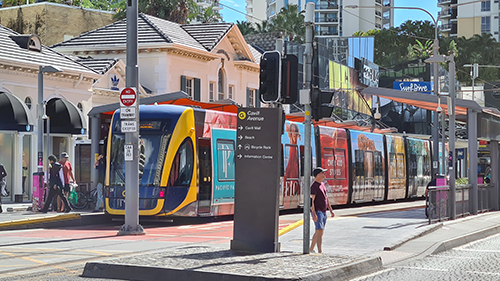Research on the Benefits of Accessible Transportation
By Laurel Brow

Social determinants of health (SDOH) are the conditions in the environments where people are born, live, learn, work, worship, play, and age.1 They have a far-reaching impact on health, well-being, and the risks individuals face throughout their lives.
SDOH encompass a broad spectrum of factors, including the availability of safe housing and neighborhoods, educational and job opportunities, access to nutritious food, freedom from discrimination and violence, and the quality of air and water. These determinants are pivotal in understanding the health disparities found in our communities.
Transportation is a Key Social Determinant of Health
Among the many facets of SDOH, access to transportation affects nearly every category.2 It is a fundamental element influencing the entire spectrum of health-related outcomes. Factors related to transportation determine whether people can easily access healthcare services, how they socialize with family members and friends, how they get to work and school, and which neighborhoods they can live and thrive in. Read on to learn more about how lack of transportation can have a profound impact on communities across the county.
Access to Healthcare: Transportation is an indispensable factor in accessing healthcare services. Medical appointments, treatments, and medications become out of reach for those who lack reliable means of getting to healthcare facilities. This, in turn, impacts health outcomes, as early interventions and preventive care may be compromised.

- Research conducted by the Urban Institute found that 21 percent of U.S. adults without access to a vehicle or public transit went without needed medical care in 2022. Adults with a disability were more than three times as likely to report skipping care due to transportation concerns.3
- A systematic review published in the Journal of Community Health reported that transportation barriers are an important barrier to healthcare access, particularly for those with lower incomes or the under/uninsured.4
Social Connections: Transportation is not just about moving from one place to another; it is also about connecting with friends and family. Isolation due to inadequate transportation options can lead to mental health issues and reduced quality of life.
- In a study published in the Disability and Health Journal, lack of transportation for the social needs of people with disabilities significantly predicted lower levels of social connectedness.5
- In a satisfaction survey conducted by the San Diego County Senior Transportation Program, 95.4 percent of participants said that the program increased their ability to complete social activities independently.

Access to Employment and Education: Reliable transportation is often the bridge that connects individuals to job opportunities and educational institutions. For those without adequate access, job prospects may remain limited, hindering their economic well-being and personal development.

- A study from the Rudin Center for Transportation Policy found that limited access to public transit in New York City neighborhoods was associated with higher levels of unemployment.6
- In a meta-analysis of 93 quantitative studies, researchers found a positive relationship between access to transportation and employment.7
- A review by the Hechinger Report stated that students who received transportation assistance were more likely to remain enrolled in college and earn a credential.8
Housing and Neighborhood Choices: Access to transportation can dictate where people can live and, by extension, the quality of their housing and neighborhoods. Those with limited transportation options may be forced into less desirable living situations.
- A review in the Journal of Affordable Housing outlined the inextricable link between transportation and housing, outlining emerging approaches to integrating policies and advancing equity for underserved populations.9
- As housing affordability lessens, many people are forced to move further away from job centers as a result. This combined cost of housing and transportation can leave residents in rural and suburban communities with a high cost of living that is comparable to their urban counterparts.10

Understanding these interconnections highlights the pivotal role of transportation as a social determinant of health. It's not merely a means of conveyance; it's a gateway to economic opportunities, education, healthcare, and social connections. The absence of reliable transportation can result in the perpetuation of health disparities, leaving vulnerable populations like older adults and people with disabilities at a distinct disadvantage.
On the Go understands that transportation is a key social determinant of health. That’s why we work with nonprofits and civic agencies to provide reliable, safe, and individualized transportation to those in need. Interested in learning more about how On the Go can help your organization with its transportation needs? Contact our Director of Operations Maureen Glaser at maureen@otgrides.org.
Sources
- U.S. Department of Health and Human Services. Social Determinants of Health.
- American Public Health Association. Transportation: A Community Driver of Health.
- Robert Wood Johnson Foundation. More than One in Five Adults with Limited Public Transit Access Forgo Health Care Because of Transportation Barriers.
- Journal of Community Health. Traveling Towards Disease: Transportation Barriers to Health Care Access.
- Disability and Health Journal. Reaching people with disabilities to learn about their experiences of social connection and loneliness.
- The Urban Institute. Transportation Access.
- Transport Reviews. Does transport help people to gain employment? A systematic review and meta-analysis of the empirical evidence.
- The Hechinger Report. A surprising reason keeping students from finishing college: A lack of transportation.
- Journal of Affordable Housing. Transportation Matters: Closing the Chasm between Housing and Transportation to Foster Communities of Opportunity for All.
- California Department of Housing and Community Development. Housing and Transportation.